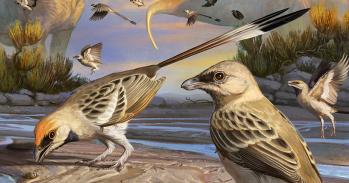
Professor Jennifer Clack’s research into one of the major events in the evolutionary history of life on Earth has been honoured by the National Academy of Sciences.
Professor Jennifer Clack’s research into one of the major events in the evolutionary history of life on Earth has been honoured by the National Academy of Sciences.
This missing link and the research it generated caused a re-evaluation of when, where, how, and in what order changes occurred during the evolutionary transition from water to land.
Over two decades ago, Professor Jennifer Clack and colleagues made a discovery in Greenland that was to overturn ideas of our evolutionary history: a 370 million-year-old tetrapod (an animal with four legs, plus fingers and toes) whose skeleton held the clues to ‘terrestriality’. This missing link and the research it generated caused a re-evaluation of when, where, how, and in what order changes occurred during the evolutionary transition from water to land. It is these important contributions to science that have recently been recognised through the awarding of the Daniel Giraud Elliot Medal to Professor Clack by the National Academy of Sciences.
‘The transition from water- to land-dwelling creatures in the Late Devonian period is one of the major evolutionary events since it triggered the radiation of all subsequent vertebrate life on land,’ explained Professor Clack, Curator of Vertebrate Palaeontology at the University’s Department of Zoology. Professor Clack’s discoveries, including the earliest foot adapted for walking, initiated a revolution in perceptions of this key transition.
‘Limbs appear to have first evolved in water and we now know that the first four-limbed creatures possessed multiple fingers and toes rather than the architypal five,’ said Professor Clack. ‘We believe that these evolved to help propel them through weed-choked swamps.’ Her climate studies suggest that the transition to land came at a time of low oxygen in the atmosphere, and even lower in the water, when being able to breathe air became an advantage.
As a result of these detailed analyses, curators are now able to recognise similar fossils in museum collections the world over. The result is a worldwide re-evaluation of the fossil record and a resurgence of interest in the field.
Almost 150 years ago, when Charles Darwin published his theories on the origin of species, the fossil record was frustratingly incomplete, with few examples of transitional stages in evolution. Professor Clack’s research is helping to complete the story.
For more information, please contact Professor Jennifer Clack (j.a.clack@zoo.cam.ac.uk).
This work is licensed under a Creative Commons Licence. If you use this content on your site please link back to this page.





